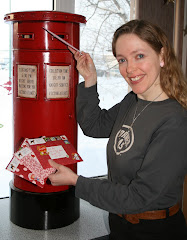 |
| From www.keepcalmandcarryon.ca |
• Keep calm – and have a cupcake.
• Keep calm – and drink beer.
• Keep calm – and party on
• Keep calm – and go shopping
• For Star Wars fans: Keep calm – and save the princess.
• Or one of my favourites – Keep calm – and call Batman.
• And probably the most honest one – Keep calm – Now panic and freak out!
These are funny, but the original poster had a serious and important purpose. It was designed in 1939, during the beginning of World War II in Britain. The idea was to encourage the British people, if the enemy invaded. And as we know, that eventually happened. In their tough times, they needed every kind of support they could get, to keep their spirits up. And whatever they did could make or break them, so having the peace of mind to make good decisions was essential.
“Keep calm – and carry on” is not a bad summary of today’s Gospel lesson, Matthew 6:24-34. It’s an especially good message for us, when we’re in a time of transition together. Our reading begins in verse 24 with a decision - serving either God or money. From that beginning, it sounds like this is going to be a sermon on money. But you can relax – because that’s not what I want to talk about today. My apologies to our treasurer! Although money is named here as a master we can serve instead of God, I think that something even more fundamental is at stake than money. We’ve all seen cases of people who hoard. There are lots of extreme cases on TV, but it also comes closer to home. It seems like we all know of someone who hoards to extremes. One of my great-aunts lived very modestly her whole life, and she didn’t even own a home. But when she died, we found out she’d been saving and hoarding thousands and thousands of dollars her whole life. And in Steve’s family, I remember visiting one lady who had kept everything she’d ever received as a Regal representative – so her apartment was so chock-full of stuff, with piles to the ceiling, that you could hardly move in there. She wasn’t rich in money, but nobody could deny she was a hoarder.
Probably you know people like this, too. And the thing is, we all have this tendency, at least to some extent. You never realize it more fully than when you move – especially when you’re trying to downsize, like Steve and I are now. Where did all this stuff come from? Why do we still have things that date from almost 20 years ago, when we lived in another time, another place and another life? The things were good, we appreciated them fully, and we used them. Back then. Not now. And not for the past five, ten or sometimes even 15 years. Yet we’ve always been reluctant to give them up. In many cases, it never even occurred to us – even though we knew we hadn’t used them in forever. Maybe you can identify. It’s not the monetary value, in most cases, that keeps all of us from letting go of things, and, as a result, makes us all amateur hoarders in our own way. What is it, that keeps us hanging onto these things that had a place, but are no longer useful to us? And in many ways are getting IN the way of our current lives, cluttering up our spaces and minds?
I said earlier that I think money is not, fundamentally, the other master we can serve instead of God. It can be – but with all of us amateur hoarders, I think it’s security. Even the hoarding of money boils down to security, really. We want to keep it on hand “just in case” or “for a rainy day.” And that goes for all our stuff, too. We might keep a spare. Or several spares. I know someone who is so security-conscious that they buy not one spare item but six! And even all that unused stuff we keep around, which was useful to us 5, 15 or 35 years ago, I think is still around in our basements and closets as a security blanket. We don’t want to let go of those memories associated with each item – and we fear we’ll forget, if we let go of the stuff. We don’t trust ourselves to remember. Or to be able to cope with forgetting.
So back to our Gospel. I think reading our choice as one between God and security is pretty fair. We all have a tendency to hang onto things – from the past or the present – instead of trusting God. He is the only one who can be trusted with those precious memories from the past. Our mementoes might literally rot in our closets, or we and everyone else might forget what they once meant. But if we commit those memories to God, he can be trusted to never forget. He will keep them safe, and when we meet him face to face one day, He will re-member those memories. Not just re-think them for us, but he’ll mould them into something we can see and hear and share with others for eternity. And He’ll show us the big picture, of how they were even more significant than we once thought. So we can let go of those old, dusty things, that gradually become kind of pathetic and sad over time, and exchange them for God’s permanent memory, with more to come in the future.
God can also be trusted with our present. Our Gospel today reminds us of several reasons why he is trustworthy. First, in verse 25, Jesus reminds us that life is more than food and clothes. And of course we know that’s true. Food and clothing will help you survive, but without all those other things that God gives us, that we really can’t make happen for ourselves – especially love and joy in life – we haven’t got much. Another reason God is trustworthy is in verse 26. Jesus reminds us that birds don’t do a single thing, to make sure food will be there for tomorrow, and they certainly don’t hoard. Yet God looks after these little creatures that we often don’t even notice, and they live carefree as a result. Since we’re worth much more than a little bird to God, we can count on him caring for us just as well and better than he does for the birds.
A third reason God is trustworthy is in verse 27. This one makes good sense, too. Jesus asks us, “Can any one of you by worrying add a single hour to your life?” In other words, If we choose not to trust God and to worry instead, will that worry do us any good at all? The answer is common sense. No. In fact, worrying can actually cause us all kinds of mental and physical anguish, as we’ve probably all experienced, at one point or another.
I especially like the fourth reason God can be trusted, in verses 28-30. Jesus reminds us that God doesn’t just keep his creation alive, he gives it abundant life. He even does what we might consider wasting creativity and care on it. The example is flowers of the field. You might think of them as canola or flax flowers in the fields, or maybe wildflowers in the thick of the woods. There are thousands – millions – of these tiny flowers just here in our part of Saskatchewan, so many that nobody could possibly see them all. And so many of them are never noticed by anybody at all. Yet God, for his own pleasure, and their own dignity as part of his creation, makes these little flowers, and he lavishes his creativity and beauty on them - even though nobody sees them and they only last a short time anyway. He thinks they’re worth it, regardless. It’s as if he makes one daisy, and is so tickled by it, that he says, “Let’s do that again!” And again. And again, until there are fields and fields, full of them. God goes over and above all expectation, for even the most insignificant little bit of his world. And he’ll do the same for us.
With all of these reasons as background, Jesus finally gives us the key to living a life of trust in God. In verse 33, he tells us, “Seek first God’s kingdom and his righteousness, and all these things will be given to you as well.” I like how The Message version of the Bible puts it: “What I’m trying to do here is to get you to relax, to not be so preoccupied with getting, so you can respond to God’s giving. People who don’t know God and the way he works fuss over these things, but you know both God and how he works. Steep your life in God-reality, God-initiative, God-provisions. Don’t worry about missing out. You’ll find all your everyday human concerns will be met.” I think we need to hear the end of that again: “Steep your life in God-reality, God-initiative, God-provisions. Don’t worry about missing out. You’ll find all your everyday human concerns will be met.” I really like how he puts that, because a lot of the time we read “Seek first God’s kingdom and his righteousness” as yet another item on a long to-do list, to make sure we’re really being good followers of Jesus. We see Jesus’ instruction as something WE do. But here we’re reminded that it’s GOD’S kingdom and GOD’s righteousness – not OURS. And as the Message puts it, we can only find this by steeping ourselves in God’s reality, God’s initiative, and God’s provisions.
In other words, it’s all about remembering that everything we are and have, together and as individuals, is a gift from God. Most of the significant things in our life we didn’t make happen. We didn’t make our husband or wife love us. It was a gift from God. We didn’t really even create our own children – God did it, and we really just watched. We didn’t really “make friends” as we like to say, because you can’t make someone like you. All of these things are gifts from God, and some of God’s greatest gifts. And then there is God’s forgiveness. Through knowing with absolute confidence that he’s really and truly forgiven us, we can live with ourselves. We can let hard things in our past finally go – not that it’s easy. We can live in the present, without obsessing over whether we’re doing the right thing or not, because we stand forgiven before God, even if we make a mistake. And we can go into the future, with hope and optimism, knowing that God can be trusted with our future in this life, and that the Great Beyond awaits us and is beyond our wildest dreams. Knowing that we’re forgiven, also makes it possible to live well with each other. We can offer that same forgiveness that God gives us, and we can receive it when we do wrong and apologize to each other. The church is the only group I know of, where forgiveness is supposed to be our reality together. We can live freely and lightly and honestly together, when we all practice it.
As we continue in this time of transition together, I know we’re all prone to worrying. Steve and I worry about what our future will look like, and you worry about yours. And we worry about each other’s futures, too. But today’s Gospel, is for us from God. Let’s determine today to steep ourselves in God’s reality, God’s initiative, and God’s provisions. In other words, let’s commit our past together, our present uncertainty, and our separate futures to God, knowing he is trustworthy. Maybe our present doesn’t look quite like what we want. And maybe our futures won’t be quite what we expect. What we can expect, though, is for God to be there, with us, supplying everything we need. And going ahead of us to make the way clear and good. He’s got a habit of surprising us with his out-of-the-box thinking, and his beyond-our-wildest-dreams, over-the-top lavish care. Let’s make sure we have our eyes wide open, so we don’t miss what he has in store. Let’s keep calm – because we trust God - and carry on. Amen.













No comments:
Post a Comment